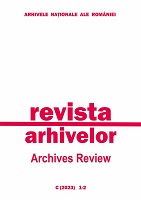Evreii bucureșteni de la binefacere la ajutor mutual în a doua jumătate a secolului al XIX-lea și la începutul secolului al XX-lea. Societatea Bezalel Toeles Hamachov (1875-1923)
The Jews in Bucharest from Charity to Mutual Assistance in the Second Half of the 19th Century and the Beginning of the 20th Century. Bezalel Toeles Hamachov Society (1875-1923)
Author(s): Lucica BercoviciSubject(s): Jewish studies, Social history, Recent History (1900 till today), Jewish Thought and Philosophy, 19th Century
Published by: Arhivele Nationale ale Romaniei
Keywords: Bezalel Toeles Hamachov; Charity; Philanthrophy; Contribution; Mutualism; Associationism;
Summary/Abstract: According to the principles of the Talmudic morality, charity represents an essential duty for each member of the Jewish community, along with work and education. Although charity and contribution are part of the Jewish tradition, the Jews have never co-ooperate in a more pragmatic way than in the 19th and 20th centuries. It was due to a complex of factors, such as the Jewish Enlightenment (Haskala) and the industrial revolution, which brought them closer to the temptation of competition and the capitalist gain, the removal from the rabbinic rigour and the isolation of the ghetto, the massive Jewish immigration from the central and Eastern Europe towards the Romanian Principalities, which required the community support of the local Jews, the disorganization of the traditional instituions, requiring the emergence of some private forms of mutual aid. There are two conclusions to be drawn in the instituional evolution of the Jews in Romania during this period. The first one admits that fact that all the communal and private settlements depended in different ways on the communities, and the second one is that they had similar and complementary attributions, acting as a safety net over all Jewish activity. Although Moses Schwartzfeld defined the Jewish societies of mutual assistance in the 19th century as representations of the modern selfishness, because they emphasized contribution over charity, they were not able to act otherwise due to lack of means, by representing the middle class and the tops of the lower class, the most affected categories by the risk of being pauperised. It is under these circumstances that the activity of Bezalel Toeles Hamachov (Israelite Society for the Healing of the Sick People) between 1875 and 1923 should be considered. It is the topic of this case study, investigated by us at the Archive of the Center for the Study of the Jewish History in Romania under the auspices of the Federation of the Jewish Communities in Romania. Fonds I and II from this archive include reports of the General Assembly of Bezalel, balance sheets, minutes of the Committee meetings, applications for admission, summons to meetings, invitations to family and social events. All these documents describe the Bezalel society and generally the Jewish community in Bucharest, as a lively world present inside of the Romanian society, which belonged to through the agency of economic activities, social expectations, reflections of the ideologies of those times.
Journal: Revista Arhivelor
- Issue Year: C/2023
- Issue No: 1-2
- Page Range: 98-117
- Page Count: 20
- Language: Romanian

